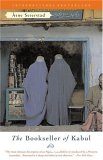Summary | Excerpt | Reviews | Readalikes | Genres & Themes | Author Bio

Critics' Opinion:
Readers' Opinion:
First Published:
Oct 2003, 320 pages
Paperback:
Oct 2004, 320 pages
The Proposal
When Sultan Khan thought the time had come to find himself a new wife, no one wanted to help him. First he approached his mother.
"You will have to make do with the one you have," she said.
Then he went to his eldest sister. "I'm fond of your first wife," she said. His other sisters replied in the same vein.
"It's shaming for Sharifa," said his aunt.
Sultan needed help. A suitor cannot himself ask for a girl's hand. It is an Afghan custom that one of the women of the family convey the proposal and give the girl the once-over to assure herself that she is capable, well brought up, and suitable wife material. But none of Sultan's close female relations wanted to have anything to do with this offer of marriage.
Sultan had picked out three young girls he thought might fit the bill. They were all healthy and good-looking, and of his own tribe. In Sultan's family it was rare to marry outside the clan; it was considered prudent and safe to marry relatives, preferably cousins.
Sultan's first candidate was sixteen-year-old Sonya. Her eyes were dark and almond-shaped and her hair shining black. She was shapely, voluptuous, and it was said of her that she was a good worker. Her family was poor and they were reasonably closely related. Her mother's grandmother and Sultan's mother's grandmother were sisters.
While Sultan ruminated over how to ask for the hand of the chosen one without the help of family women, his first wife was blissfully ignorant that a mere chit of a girl, born the same year she and Sultan were married, was Sultan's constant preoccupation. Sharifa was getting old. Like Sultan, she was a few years over fifty. She had borne him three sons and a daughter. The time had come for a man of Sultan's standing to find a new wife.
"Do it yourself," his brother said finally.
After some thought, Sultan realized that this was his only solution, and early one morning he made his way to the house of the sixteen-year-old. Her parents greeted him with open arms. Sultan was considered a generous man and a visit from him was always welcome. Sonya's mother boiled water and made tea. They reclined on flat cushions in the mud cottage and exchanged pleasantries until Sultan thought the time had come to make his proposal.
"A friend of mine would like to marry Sonya," he told the parents.
It was not the first time someone had asked for their daughter's hand. She was beautiful and diligent, but they thought she was still a bit young. Sonya's father was no longer able to work. During a brawl a knife had severed some of the nerves in his back. His beautiful daughter could be used as a bargaining chip in the marriage stakes, and he and his wife were always expecting the next bid to be even higher.
"He is rich," said Sultan. "He's in the same business as I am. He is well educated and has three sons. But his wife is starting to grow old."
"What's the state of his teeth?" the parents asked immediately, alluding to the friend's age.
"About like mine," said Sultan. "You be the judge."
Old, the parents thought. But that was not necessarily a disadvantage. The older the man, the higher the price for their daughter. A bride's price is calculated according to age, beauty, and skill and according to the status of the family.
When Sultan Khan had delivered his message, the parents said, as could be expected, "She is too young."
Anything else would be to sell short to this rich, unknown suitor whom Sultan recommended so warmly. It would not do to appear too eager. But they knew Sultan would return; Sonya was young and beautiful.
He returned the next day and repeated the proposal. The same conversation, the same answers. But this time he got to meet Sonya, whom he had not seen since she was a young girl.
Copyright © 2002 by Åsne Seierstad





The House on Biscayne Bay
by Chanel Cleeton
As death stalks a gothic mansion in Miami, the lives of two women intertwine as the past and present collide.

The Flower Sisters
by Michelle Collins Anderson
From the new Fannie Flagg of the Ozarks, a richly-woven story of family, forgiveness, and reinvention.

The Funeral Cryer by Wenyan Lu
Debut novelist Wenyan Lu brings us this witty yet profound story about one woman's midlife reawakening in contemporary rural China.
Your guide toexceptional books
BookBrowse seeks out and recommends the best in contemporary fiction and nonfiction—books that not only engage and entertain but also deepen our understanding of ourselves and the world around us.